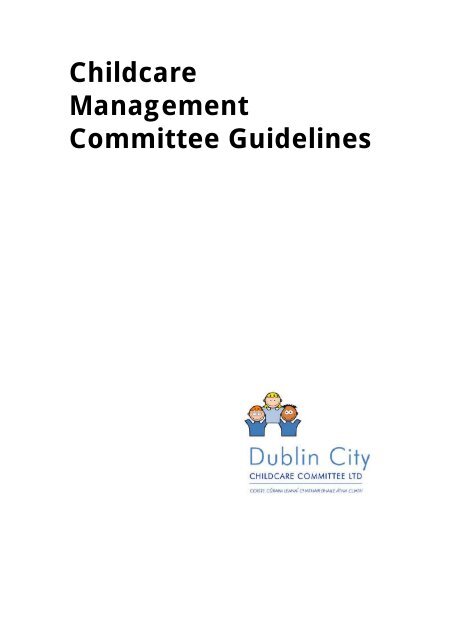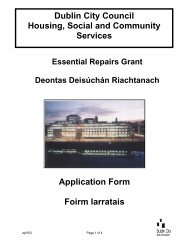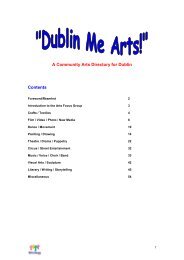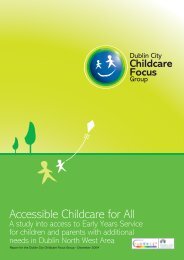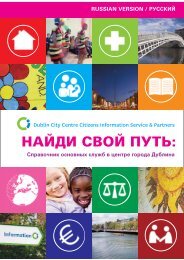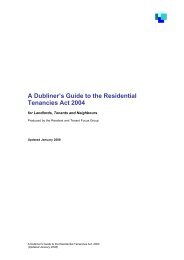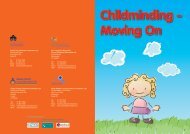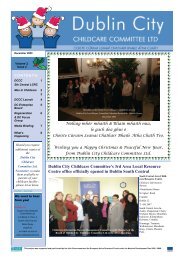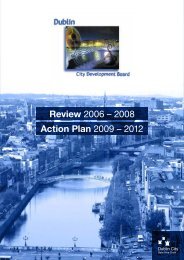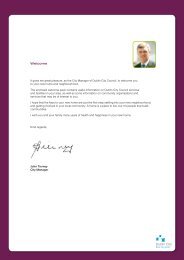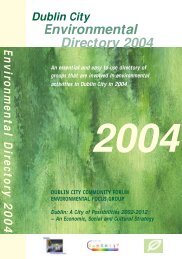Childcare Management Committee Guidelines - Dublin.ie
Childcare Management Committee Guidelines - Dublin.ie
Childcare Management Committee Guidelines - Dublin.ie
Create successful ePaper yourself
Turn your PDF publications into a flip-book with our unique Google optimized e-Paper software.
<strong>Childcare</strong><br />
<strong>Management</strong><br />
<strong>Committee</strong> <strong>Guidelines</strong>
‘The <strong>Dublin</strong> City <strong>Childcare</strong> <strong>Committee</strong> (DCCC) is committed to creating an<br />
environment that values all children, by facilitating the development of an<br />
infrastructure of high quality edu-care services that support the holistic<br />
development of children in the context of family and community throughout<br />
<strong>Dublin</strong> City.’<br />
As identif<strong>ie</strong>d in our strategy, ‘thematic working groups’ are brought together<br />
and their aim is to develop integrated planning and cohesion in giving support<br />
to local childcare providers.<br />
The group identif<strong>ie</strong>d the need for management committees of childcare<br />
facilit<strong>ie</strong>s to have access to guidelines that will assist them in fulfilling their<br />
roles and responsibilit<strong>ie</strong>s as managers and employers as well as providers of<br />
quality childcare services. ‘<strong>Childcare</strong> <strong>Management</strong> <strong>Committee</strong> <strong>Guidelines</strong>’ were<br />
therefore compiled.<br />
Elenora Griffin<br />
Programme Development Officer,<br />
<strong>Dublin</strong> City <strong>Childcare</strong> <strong>Committee</strong><br />
October, 2004<br />
2
Contents<br />
The <strong>Committee</strong> 4<br />
Developing polic<strong>ie</strong>s and procedures 6<br />
Mission Statement / Ethos 7<br />
Aims & Objectives of provision 7<br />
Working with Children 7<br />
Health, Safety & Welfare 8<br />
Partnership with Famil<strong>ie</strong>s & Community 10<br />
Administration 11<br />
Records to be Kept 12<br />
Parents Handbook 14<br />
Human Resources 15<br />
Child Welfare / Protection 17<br />
Positive Behaviour <strong>Management</strong> 18<br />
Out of / After School Care 19<br />
Anti bias / Anti Discrimination Policy 20<br />
Awareness of & Compliance with statutory & legal<br />
requirements 21<br />
Other <strong>Committee</strong> Responsibilit<strong>ie</strong>s 23<br />
Bibliography 25<br />
Other Useful Publications 25<br />
National Voluntary <strong>Childcare</strong> Organisations 30<br />
3
The <strong>Committee</strong><br />
Comprehensive and Representative<br />
The committee should comprise of members who have skills that can<br />
comprehensively support all areas of work that have to be carr<strong>ie</strong>d out by<br />
the group.<br />
The committee should also be representative of the major stakeholders<br />
and the community it serves. Therefore, the committee should include<br />
members such as community representatives, business professionals living<br />
and/or working in the local community, a childcare professional, a parent<br />
and a children’s representative where appropriate.<br />
Contact can be made with local compan<strong>ie</strong>s who may be willing to<br />
volunteer time to the committee, either on an ongoing or an intermittent<br />
basis, to assist with such activit<strong>ie</strong>s as quarterly accounting or on a one-off<br />
basis for such activit<strong>ie</strong>s as developing standard staff contracts.<br />
Initial Work of the <strong>Committee</strong><br />
Elections of a chairperson, secretary, treasurer, person(s) to take<br />
minutes and a meeting facilitator if these are not a role of the chairperson.<br />
Establish roles, responsibilit<strong>ie</strong>s and obligations of each committee<br />
member.<br />
Develop agreed common values and vision for the future.<br />
Establish service – as a Limited Company, either registered for tax or as<br />
a company with charitable status and registered as an employer. ( Annual<br />
employer registration – P30)<br />
Business plan - The business plan needs to be realistic. It should be<br />
based on actual resources of the service and what can realistically be<br />
obtained.<br />
Set Goals for the attainment of the vision and business plan. Have<br />
S.M.A.R.T goals - Specific, Measurable, Attainable, Realistic, Time Frame<br />
4
Creation of a New Service<br />
Level of work required by the committee will depend on the<br />
specific circumstance. i.e. New Building, Refurbishment of old building,<br />
public/private funding, compliance with ‘<strong>Childcare</strong> Facilit<strong>ie</strong>s; <strong>Guidelines</strong> for<br />
Planning Authorit<strong>ie</strong>s’.<br />
When Service is Operational<br />
Ensure that the facility meets its obligation to notify the Health Board<br />
and be inspected as prescribed by the 1996 Child Care (Pre-School)<br />
Regulations.<br />
Ensure that polic<strong>ie</strong>s and procedures are developed to take into<br />
account all aspects of the service. See Next Section<br />
5
Developing polic<strong>ie</strong>s and procedures<br />
Please note that using polic<strong>ie</strong>s, procedures, record keeping<br />
templates, and so forth, from others services can be helpful when<br />
developing polic<strong>ie</strong>s but that it is important for a service to develop<br />
their own polic<strong>ie</strong>s in order for them to be relevant and meaningful<br />
for the service and therefore practical for the service implement.<br />
Polic<strong>ie</strong>s and Procedures should be transparent and accessible by all who use<br />
the service. They need to be developed and regularly rev<strong>ie</strong>wed in consultation<br />
with staff and any other relevant stakeholders. This is essential for the<br />
effective implementation of polic<strong>ie</strong>s and procedures as through collaboration,<br />
all part<strong>ie</strong>s involved can reach agreement, ownership and commitment to carry<br />
out agreed upon actions, that suit the unique needs of the service.<br />
Polic<strong>ie</strong>s and procedures need to be dynamic to ensure they respond to the<br />
changing needs of the childcare environment. It is therefore essential that a<br />
framework is put in place for the regular reflection on, and evaluation of<br />
practice and that insights gained from this process be used to adapt polic<strong>ie</strong>s<br />
and procedures.<br />
Polic<strong>ie</strong>s should outline the fundamental strategy/approach to be used in the<br />
service and need to be underpinned by clear procedures that provide more<br />
detailed guidelines and processes for the service. They should reflect the core<br />
principles/ethos of the service and be based on what can be realistically<br />
delivered. Well thought out polic<strong>ie</strong>s and procedures ensure that ambiguity is<br />
avoided, thus reducing frustration or disappointment and therefore<br />
encourages a harmonious working environment. Professionalism and<br />
consistency are promoted which supports and aids children’s emotional<br />
development.<br />
Careful attention should be given to the format of polic<strong>ie</strong>s and procedures.<br />
They should be br<strong>ie</strong>f, to the point and written in plain language. Consider if<br />
cl<strong>ie</strong>nts with poor language skills, literacy skills, English as a second language<br />
or a disability can access them? Also consider presenting polic<strong>ie</strong>s and<br />
procedures to parents/guardians, staff and children. Ensure that they are<br />
included in inductions. Audio/video format, translations into other languages<br />
spoken in the community and so forth can help ensure access by all.<br />
Polic<strong>ie</strong>s and procedures should cover the following areas; -<br />
N.B. This list is not exhaustive<br />
6
Mission Statement / Ethos<br />
Vision/Philosophy of the service<br />
Statement of commitment to equal opportunit<strong>ie</strong>s/non-discrimination<br />
Aims and Objectives of provision<br />
Statement of the services’ priorit<strong>ie</strong>s and the objectives planned for<br />
ach<strong>ie</strong>ving them. The aims should include the services’ definition of quality<br />
childcare and outline the objectives put in place to continually improve<br />
quality.<br />
Working with Children<br />
Services Provided<br />
Staff Ratios<br />
Child Development/Psychology<br />
Cultural, social and moral values<br />
Curriculum/Methodolog<strong>ie</strong>s/Pedagogy (IPPA – Supporting Children<br />
through Play – Power of Play, NCCA – Towards A Framework for Early<br />
Learning, Montessori, High Scope, Steiner, etc.)<br />
Record keeping - Planning, observation, assessment, reflection,<br />
evaluation and informing planning<br />
Settling In<br />
Play – philosophy towards play, facilitation for planned, structured and<br />
free flow play.<br />
Outdoor Play – Where possible children should have access to quality<br />
outdoor play everyday. Outdoor Play policy should highlight that the<br />
outdoor area is seen as an extension of the classroom. The policy should<br />
take account of Toys and Equipment used in the area, age/stage of<br />
development and appropriate outdoor activit<strong>ie</strong>s, Gardening, Nature<br />
Stud<strong>ie</strong>s, Areas available for qu<strong>ie</strong>t/ driving/ climbing/ construction/ sitting/<br />
shade/ running/ sand/ water/ creative activit<strong>ie</strong>s, Supervision of outdoor<br />
area, Security, Hazards, Safety Inspections of area and equipment and<br />
weather appropriate clothing/skin protection<br />
Equipment/Toys<br />
Timetabling<br />
Pets Check that pets do not trigger allerg<strong>ie</strong>s in children & staff,<br />
arrangements for regular checks with a vet, regular vaccinations &<br />
worming, day to day care of pets and supervision of children with pets<br />
Children’s clothing – required and recommended clothing. For example<br />
nursery sweatshirt, shoes children can take off and put on themselves and<br />
so forth.<br />
Children’s rights in line with UNCRC – Also consider Equal<br />
Opportunit<strong>ie</strong>s/ Anti-Bias Approach / Social Justice<br />
Disablilit<strong>ie</strong>s / Special / Additional Needs - Facilitation of children with<br />
special/additional needs and specific requirements. Disability Bill,2004.<br />
Meals / Snacks – <strong>Guidelines</strong> for feeding children by age group, What the<br />
service will provide, nutritional policy and what parents need to provide<br />
7
Health, Safety and Welfare – provision for a safe work and play<br />
environment<br />
Officers - Appointment of First Aiders (one present at all times the<br />
service is open), a Health and Safety Officer and an elected staff health<br />
and safety representative. Roles and responsibilit<strong>ie</strong>s outlined for both<br />
positions<br />
First Aid Boxes – (Including blue plasters if there is food preparation on<br />
the premises)<br />
Training Health and Safety / Prevention of Infection / Child Protection /<br />
Food Hyg<strong>ie</strong>ne, storage and preparation training for all staff (Basics<br />
covered in induction)<br />
Cleaning schedule that ensures a high standard of cleanliness is<br />
maintained, preventing any possible spread of infection and to provide for<br />
extra cleaning following the outbreak of an infectious disease – Lists of<br />
fixtures, fittings, equipment and areas with cleaning details and regularity<br />
of cleaning, lists of suitable cleaning agents provided with instructions and<br />
what they should and should not be used on, cleaning check sheets and<br />
instructions for cleaning bodily fluids and excretions and everyday clean as<br />
you go policy (Both indoors and outdoors).<br />
Storage - Safe storage of cleaning materials/ dangerous substances<br />
HACCP – Hazard Analysis Critical Control Point<br />
Child Protection – See Children First 1999 Department of Health and<br />
Children and relevant section in this document<br />
Child Collection and Drop off – list of adults authorised to collect each<br />
child, photo identity requirements of adults collecting children (and any<br />
unknown person entering the service), request to be informed of any<br />
court orders restricting access of parent/guardian to a child, early<br />
arrival/late collection (cost), emergency and alternative contact details<br />
Food (where relevant) – Food Safety System for the safe production of<br />
food, temperature monitoring, pest control measures, cleaning programme<br />
for food areas, identification of Critical Control Points (CCP’s), confirmation<br />
of food suppl<strong>ie</strong>rs registration with appropriate authorit<strong>ie</strong>s…<br />
Outings – Safety, Permission slips, insurance coverage, use of vehicles,<br />
role of parents/guardians, costs, subsid<strong>ie</strong>s for costs…<br />
Health and Safety Statement concerning welfare of staff and children<br />
(The Safety, Health and Welfare at Work Act 1989)<br />
Accident and Incident – Accurate notation for any adult or child who<br />
suffers an accident or injury on site or in the care of the service in<br />
specif<strong>ie</strong>d accident/incident book (persons name, date, time, place,<br />
accurate details of what happened, name to adult witness, action taken,<br />
signature of informed parent), procedure for notifying parents, rev<strong>ie</strong>w<br />
dates by Health and Safety Officer to identify hazardous areas…<br />
Be Hyg<strong>ie</strong>nic – develop an awareness of hyg<strong>ie</strong>nic habits in children, for<br />
example hand-washing, using tissues/covering face when sneezing/<br />
coughing/ blowing nose, etc. Disposal of used tissues, washing hands with<br />
anti-bacterial soap and paper towels…<br />
8
Contact details for relevant health services, local doctor, community<br />
nurse, emergency numbers, duty social worker/childcare manager and<br />
voluntary organisation. Information booklets available to staff and<br />
parents/guardians about common childhood illnesses and other child care<br />
related issues<br />
Exclusion of sick or unwell children/staff – I.e. for 24 hours after<br />
diarrhoea or vomiting, temperature above 100.4 / 38 F… Emergency<br />
contact numbers for parents/guardians of child’s illness and procedure for<br />
dealing with a child requiring emergency treatment (If in doubt concerning<br />
particular childhood illnesses contact the local public health nurse)<br />
Storage and administration of medication – Permission forms, cold<br />
and dry storage areas out of reach of children, administration forms,<br />
nominated staff member responsible for administration and storage,<br />
procedure for bring in and taking home medications…<br />
Fire Procedure – evacuation procedure and regular checks of fire<br />
fighting equipment.<br />
No smoking policy – Public Health (Tobacco)(Amendment) Act, 2004<br />
(Commencement) Order, 2004<br />
Supervision of children – Staff ratios, role of students/volunteers…<br />
Security procedures – services boundar<strong>ie</strong>s, admission of visitors/ parents/<br />
guardians, children’s access to external areas…<br />
Nappy changing and toileting procedures<br />
Consumption of hot food and drinks in the building<br />
Safe movement around the building, i.e. avoid running, safe<br />
movement of furniture, etc.<br />
9
Partnership with Famil<strong>ie</strong>s and Community<br />
Communication - Established lines of communication for the sharing of<br />
information – newsletter, parent/community notice board, open evenings,<br />
social evenings, communication skills training, regular meetings…<br />
Partnership with parents – an indicator of a quality service. In order to<br />
be effective policy should be based on parents’ / guardians needs and<br />
v<strong>ie</strong>ws and should be developed in partnership with them. Policy should<br />
also recognise parents/ guardians as the primary and most important<br />
carers/ educators of their children.<br />
Inductions – for parents/ guardians/ volunteers/ new staff/ students…<br />
Community Links – local institutions, organisations, business people,<br />
extended family members…<br />
Statutory Links – Health Board, National Children’s Office, and so on<br />
Voluntary Links – Membership to National Voluntary Organisations for<br />
example NCNA, IPPA, Barnardos…<br />
Aesthetics - Establishing and maintaining a welcoming environment that<br />
promotes partnership – Welcome signs, names and photos of staff, adult<br />
sized chairs, surroundings and equipment that reflect the diversity of the<br />
community, child fr<strong>ie</strong>ndly waiting areas…<br />
Partnership Resources – Allocation of resources, space, time, training<br />
and funding for partnership activit<strong>ie</strong>s.<br />
10
Administration<br />
Confidentiality – Information held by the service only to be shared with,<br />
accessed by, people with a legitimate right or need to know, for example<br />
staff, parents, guardians, persons with legal authorization. People<br />
receiving information should be aware of and agree to the services<br />
confidentiality policy. Information shared must not be excessive in relation<br />
to the purpose of sharing the information. The policy should state<br />
obligations on the service to share information or concerns with statutory<br />
bod<strong>ie</strong>s and the process for doing so, for example child protection<br />
concerns. Measures need to be included for the safe and secure storing of<br />
private and sensitive information. Statement confirming the rights of those<br />
whom information is stored about them to access that information and to<br />
have the details amended if they are incorrect.<br />
Admissions - Criteria for the allocation of places (prioritisation of places<br />
i.e. for siblings, reservation of places i.e. by compan<strong>ie</strong>s for employees)<br />
restrictions i.e. age and/or toileting ability, waiting lists, intake, settling in,<br />
registration and enrolment procedure<br />
Fees – amounts, payments, non-payment, refunds, increments,<br />
discounts…<br />
Complaints/compliments/Breach of Confidentiality – procedures,<br />
processes and guidelines for recording and acting upon.<br />
Code of Work Practice / Operating Principles / Ethics<br />
Financial Policy<br />
Background - history of the service<br />
Fundraising<br />
Record Keeping<br />
11
Records to be Kept – children’s records must be kept securely until the<br />
child reaches 21 years of age and should then be disposed of in a manor<br />
that continues to protect confidentiality, i.e. shredded. Records should be<br />
written in a factual and objective manor.<br />
Application forms – enrolment / registration forms<br />
Attendance Register - Name, address, D.O.B, Commencement and<br />
Finishing dates<br />
Parent/guardian details - Name, address, daytime contact number,<br />
emergency contact number, authorisation for collection of the child,<br />
special circumstances i.e. parental access rights following divorce,<br />
separation and so forth<br />
Children’s details - Illness, disability, allergy, d<strong>ie</strong>tary information, any<br />
special care and/attention required, name and number of GP and record of<br />
immunisations, developmental history, Cultural/ Religious bel<strong>ie</strong>fs and<br />
practices, home/ first/ other languages and general information, i.e.<br />
Dislikes, likes, interests, favourite toy…<br />
Staff, Volunteers and Students Records - Name, position,<br />
employment history, C.V. or application form, letter of application, score<br />
sheets from interv<strong>ie</strong>w and selection criteria, qualifications, references,<br />
contract, training programme, daily staff rotas, ratio requirements, breaks,<br />
supervision, staff meetings, absences, salary…<br />
Operational Details - Daily attendance record, max. Numbers catered<br />
for, staff/child ratios, type of care programme provided, facilit<strong>ie</strong>s available,<br />
opening hours and fees…<br />
Medication, accidents and incidents - Signed permission for<br />
emergency medical treatment or administration of medication, any<br />
medication administered in the service and details of accident/injury to<br />
anyone in the service, details of first aiders on duty<br />
Accidents and incidents book - See Health and Safety<br />
Fire procedures - Record fire drills that are carr<strong>ie</strong>d out on a regular<br />
basis. Number, type and maintenance records for fire fighting equipment.<br />
Evacuation procedures displayed in conspicuous places<br />
Parent/Guardian Contract<br />
• Agreement with services’ polic<strong>ie</strong>s and procedures relevant to parents<br />
• Permission for photographs and/or videoing of the child<br />
• Permission for emergency medical attention<br />
• Hours/days their child will attend (schedule/timetable)<br />
• Fee per week/month/term - what is covered by fee<br />
• Method and time of payment / additional costs<br />
• Fee structure<br />
• Holidays/sickness of child in respect of fees<br />
• Timekeeping of parents – any extra charges for early drop off / collection<br />
• Agreement to give notice of illness (esp. infectious) / non-attendance /<br />
notice period for each party to terminate the contract / notice period for<br />
changing the attendance of child<br />
12
Observations and Assessments of children - Log book/dairy/<br />
developmental records/daily record sheet<br />
Visitors Book – Name, date, time and identification produced<br />
Compliments and Complaints records<br />
Waiting list<br />
Consent forms – Outings, short term administration of medication…<br />
Regular checks/safety audit<br />
Inventory of equipment and materials<br />
Public Notices - On display in the service should be insurance<br />
certificates, staff qualifications, roles and positions, positive behaviour<br />
management policy, health and safety certificates, membership certificates<br />
to childcare organisations, equal opportunit<strong>ie</strong>s statement, Ethos/mission<br />
statement, emergency contacts…<br />
Updates – processes for keeping information up-to-date and relevant.<br />
Accounts – Bank account details, statements, income & expenditure<br />
records, receipt book, cheque payment journal, petty cash book, separate<br />
accounts and records for funding, fixed asset register…<br />
13
Parents Handbook - Asking parents/guardians to sign off handbooks<br />
encourages them to read through the handbook and to ask questions to<br />
check their understanding.<br />
Ethos/Aims/Philosophy/Mission statement<br />
Contact details - for the service in and out of hours<br />
Polic<strong>ie</strong>s and procedures - relevant to parents – For example, Settling In<br />
procedure, behaviour management, child collection and drop off,<br />
partnership with parents, items provided by parents, food and nutrition,<br />
access to records, children & illnesses, closures, child protection<br />
Number and age range currently catered for<br />
Timetable - example of typical child’s day and regular weekly activit<strong>ie</strong>s<br />
Curriculum/ methodolog<strong>ie</strong>s<br />
<strong>Management</strong> committee - details of and procedures for standing for a<br />
parent place on the committee<br />
Staff - List of staff with their position, qualification and exper<strong>ie</strong>nce. Staff<br />
contact for specific quer<strong>ie</strong>s, for example health and safety officer<br />
concerning hazards.<br />
Calendar - of opening hours, holidays, training days…<br />
Fees and payment – what is and is not including, how and when<br />
payment should be made…<br />
Health Board Inspection – summary and report available on request.<br />
Membership - Statement of membership to national voluntary childcare<br />
organisations<br />
Parent participation and visitation policy<br />
Making Contact – Formal and informal arrangements for parents to<br />
discuss their child’s development, progress, difficult<strong>ie</strong>s and contribute to<br />
the care and education of their child in the service and to the general<br />
development of the service.<br />
14
Human Resources – N.B. <strong>Management</strong> committees of childcare facilit<strong>ie</strong>s<br />
have responsibilit<strong>ie</strong>s as employers<br />
Equal Opportunit<strong>ie</strong>s (incorporating equality, diversity and inclusion)<br />
must apply to all actions through the following clear guidelines that are<br />
fair and consistently implemented.<br />
Recruitment and Selection procedures – see Employment Equality<br />
Act 1998<br />
- Job description (roles and responsibilit<strong>ie</strong>s) – for management<br />
committee members, managers, supervisors, workers, volunteers,<br />
students...<br />
- Personal specification – Stipulated minimum qualifications, exper<strong>ie</strong>nce<br />
and personal qualit<strong>ie</strong>s required for each role existing within the<br />
organisation.<br />
- Application forms – if applicable<br />
- Selection criteria – based upon the job description and personal<br />
specification<br />
- Interv<strong>ie</strong>w panel – minimum of two people working from an agreed<br />
score sheet based upon the selection criteria.<br />
- Vetting - Verification of information suppl<strong>ie</strong>d and at least two<br />
references. Where possible Garda Clearance<br />
- Offer/Regret – standard letter for advising candidates of the results of<br />
their application<br />
- Employment contract (See relevant employment acts)<br />
Probation period<br />
Conditions of work<br />
Discipline Procedure<br />
Gr<strong>ie</strong>vance Procedure<br />
Bullying and Sexual Harassment<br />
Payment of wages – hourly, weekly, monthly, cheque, electronic<br />
transfer, pay slips…<br />
Record keeping regulations – responsibilit<strong>ie</strong>s of staff, volunteers and<br />
students when handling confidential information<br />
Leave – Annual holiday / Compassionate / Public holidays / Force Majeure<br />
/ Maternity / Adoptive / Parental / Career breaks<br />
Sick Pay – certif<strong>ie</strong>d / uncertif<strong>ie</strong>d<br />
Medical Appointments<br />
Jury Service<br />
Time in L<strong>ie</strong>u/Overtime<br />
Staff use of service facilit<strong>ie</strong>s i.e. e-mail and Internet<br />
Trade Union membership<br />
Travel allowances/expenses<br />
Staff handbook / Induction – To include details on the service in<br />
general, the services polic<strong>ie</strong>s and procedures, good practice guidelines,<br />
code of ethics, effective work practices with children and parents /<br />
guardians, personnel structure of the service, wages, timekeeping, leave,<br />
15
dress code, working hours, breaks, training, study leave, supervision,<br />
support, appraisals…<br />
Key Worker – role and responsibilit<strong>ie</strong>s<br />
Termination of employment – Resignation, dismissal, termination of<br />
employment, redundancy, retirement, notice periods, requesting<br />
references…<br />
Volunteers/Students – policy in relation to<br />
Staff Communication - Established lines of communication for the<br />
sharing of information throughout the service, i.e. staff meetings<br />
Use of personal mobile phones / receiving personal calls<br />
Work/Life Balance policy – Family Fr<strong>ie</strong>ndly initiatives, i.e. job sharing,<br />
flexible working hours…<br />
Staff development<br />
Smoking Ban – guidelines for those who do smoke, i.e. distance from<br />
perimeter of service where smoking will be tolerated…<br />
16
Child Welfare / Protection – See Children First – National<br />
<strong>Guidelines</strong> for the Protection & Welfare of Children, 1999<br />
Child Protection Officer – A designated senior member of staff<br />
responsible for ensuring child protection training for all staff, information<br />
for parents and to follow up reports of suspicions of abuse and actual<br />
abuse.<br />
Welfare – Statement of the services intent and procedures for promoting<br />
the general welfare, health, development and safety of children. The<br />
promotion of safe working practices.<br />
Child Protection and Welfare – to include transparent procedures for<br />
reporting suspected/disclosed abuse and obligation on personnel to report<br />
any suspicions of abuse that are based upon reasonable grounds.<br />
Duty to Protect Children and Support Famil<strong>ie</strong>s<br />
Principles for Best Practice in Child Protection<br />
Definition and Recognition of Child Abuse – Emotional, Physical,<br />
Sexual abuse and Neglect<br />
Reporting Child Protection Concerns / Obligation to Report (Individual<br />
and corporate) / Standard reporting Procedure / Notifying Health Board<br />
Child Care Manager<br />
Co-operating with Parents/Carers<br />
Roles and responsibilit<strong>ie</strong>s for working with and co-operating with<br />
agenc<strong>ie</strong>s throughout child protection cases<br />
Bullying/Peer abuse<br />
Children with disabilit<strong>ie</strong>s – Acknowledgement of possible extra<br />
vulnerability<br />
Support Services - Information on support services for children and<br />
famil<strong>ie</strong>s<br />
Allegations against employees and volunteers – procedures for dealing<br />
with employees and employer’s duty of care for children<br />
Children First / Keeping Safe Training<br />
Equal Opportunit<strong>ie</strong>s (Equality, diversity and inclusion)<br />
Integration of children with special needs<br />
Language and Literacy (consider those in the community for whom<br />
English is a second language and ensure they understand definitions of<br />
abuse and procedures if abuse is suspected.)<br />
Garda Clearance must be obtained for staff funded under the Equal<br />
Opportunit<strong>ie</strong>s <strong>Childcare</strong> Programme. This can be obtained through the<br />
<strong>Childcare</strong> Directorate (01 602 8202). The ISPCC is leading a Vetting<br />
Campaign to improve vetting of those who work with children. Contact<br />
them to receive a signature book if you wish to support the campaign.<br />
Recruitment and selection of staff, volunteers and students must ensure<br />
that references and details are always verif<strong>ie</strong>d.<br />
17
Positive Behaviour <strong>Management</strong><br />
* To ensure a consistent and positive approach, staff, parents/guardians,<br />
students, volunteers and where appropriate children must be involved in<br />
the development of behaviour policy and procedures.<br />
* Provide clear guidelines of what is positive and acceptable behaviour<br />
and how such behaviour can be promoted through example, positive<br />
reinforcement, encouragement, freedom of choice and respect for all.<br />
* Outline clear boundar<strong>ie</strong>s of behaviour and prohibited practices (i.e.<br />
slapping, humiliation or shouting) for children, staff, students, volunteers,<br />
parents and visitors whilst in the service.<br />
* Procedures when incidents of Bullying occur or there is use of<br />
inappropriate language.<br />
* Ensure polic<strong>ie</strong>s and procedures are developmentally appropriate and<br />
that they outline ages and stages that children may naturally begin to<br />
exhibit some challenging behaviours, how the service chooses to deal with<br />
these behaviours and support the child through the stage, i.e. temper<br />
tantrums, biting…<br />
* Policy for the formation of action plans for dealing with ongoing<br />
problem behaviour to include regular rev<strong>ie</strong>w dates.<br />
* Policy on the promotion of quality and fairness, promotion of children’s<br />
self-image, self-esteem, personal, group and community identity,<br />
development of children’s decision making, questioning and challenging<br />
skills.<br />
Policy for informing parents about incidents of inappropriate / challenging<br />
behaviour – what is reported to parents, how is it reported, who reports it,<br />
confidentiality of third part<strong>ie</strong>s…<br />
18
Out of / After School Care (where applicable)<br />
Provision - Outline out of school care that is provided – opening hours,<br />
school holidays, in-service days, early closing…<br />
Links - with local schools and other out of school services<br />
Collection service (if applicable)<br />
Polic<strong>ie</strong>s and procedures – those outlined here will also apply to Out of<br />
School Services and where appropriate the children should be involved in<br />
the development of them. Some polic<strong>ie</strong>s and procedures will have to be<br />
amended to suit the age and stage of development of the children that are<br />
catered for (i.e. Behaviour management for older children, play policy,<br />
supervision, ratios…).<br />
Equipment – Age and stage appropriate toys, materials, resources,<br />
books, furniture.<br />
Care Programme - to include policy towards doing homework, providing<br />
/ serving food, use of television / audio equipment, access to the<br />
outdoors, level of supervision (NCNA recommended ratios for out of school<br />
care services: - 1:8 for 4 to 6 years; 1:10 for 6 to 8 years; 1:12 for 8 – 12<br />
years)…<br />
Training – specialist training for staff specifically in the area of out of /<br />
after school care.<br />
19
Anti-Bias/Anti-Discrimination Policy<br />
An anti- bias policy should;<br />
* State a commitment to address racism, discrimination, prejudice, bias<br />
and stereotyping, while promoting equality of access, involvement,<br />
participation and outcome for all.<br />
* Outline of the active, everyday approach in the service towards teaching<br />
about diversity in culture, gender, ability, class, language, religion, and so<br />
forth, so that all of the children and adults value and celebrate the<br />
differences and similarit<strong>ie</strong>s between themselves and others.<br />
* Outline the approach used to enhancing the personal, family and group<br />
identity of each child. Acknowledgement and respect of home languages<br />
and traditions<br />
* Provide guidelines for the regular evaluation of the services<br />
environment to ensure that it positively supports an anti-bias approach<br />
and enhances the identit<strong>ie</strong>s of all community members, i.e. an<br />
environment that depicts a var<strong>ie</strong>ty of cultures while not reinforcing<br />
stereotypes.<br />
* Procedures for addressing discrimination and evaluating effectiveness of<br />
the anti-bias approach – ensuring that equal opportunit<strong>ie</strong>s are upheld and<br />
social justice is a feature of everyday practice<br />
* Anti-Bias reflection, training and facilitation<br />
* Strategy for challenging negative attitudes, behaviour, discrimination<br />
and support promotion of attitudes and behaviours that show respect for<br />
all people in the service.<br />
Further support for the development of polic<strong>ie</strong>s and procedures can<br />
be obtained from;<br />
National Voluntary <strong>Childcare</strong> Organisations<br />
Health Board Pre-School Officers<br />
Employer Organisations/ Trade Unions<br />
Local <strong>Childcare</strong> Resource Centres<br />
20
Awareness of and compliance with statutory and<br />
Legal requirements<br />
<strong>Childcare</strong><br />
The Child Care Act 1991, Part VII<br />
United Nations Convention on the Rights of the Child – 1992<br />
Child Care (Pre-School Services) Regulations 1996 Amended 1997 (Also<br />
available is an explanatory guide to the regulations)<br />
Strengthening Famil<strong>ie</strong>s for Life: Report of the Commission on the Family 1998<br />
Protection of Persons reporting Child Abuse Act 1998<br />
The National <strong>Childcare</strong> Strategy 1999<br />
Ready to Learn: White Paper on Early Education 1999<br />
Children First: National <strong>Guidelines</strong> for the Protection and Welfare of Children<br />
1999<br />
The National Children’s Strategy 2000<br />
Our Duty To Care 2002<br />
Quality <strong>Childcare</strong> and Lifelong learning: Model Framework for Education,<br />
Training and Professional Development in ECCE Sector 2002.<br />
Ready, Steady, Play: The National Play Policy 2004<br />
Towards a Framework for Early Learning – A consultative document – NCCA<br />
2004<br />
Employment<br />
Anti-discrimination (pay) Act 1974<br />
Jur<strong>ie</strong>s Act 1976<br />
Protection of Employment Act 1977<br />
Pensions Act 1990<br />
Industrial Relations Act, 1946 & 1990<br />
Protection of Employees (Employer’s Insolvency) Acts, 1984-1991<br />
Workers Protection (regular Part-time employment) Act, 1991<br />
Minimum Notice and Terms of Employment Act 1973-1991<br />
Worker Participation (State Enterprises) Acts, 1977-1993<br />
Unfair Dismissal Act 1977-1993<br />
Protection of Young Persons (Employment) Act, 1996<br />
Organisation of Working time Act 1997 Section III<br />
Statutory Calculation of Annual Leave Entitlements<br />
Pro Rata Entitlement<br />
Public Holidays<br />
Payment for Public Holidays<br />
Absences from Work<br />
Organisation of Working Time Act 1997 (rest periods)<br />
Parental Leave Act 1998<br />
Force Majeure Leave<br />
21
Employment Equality Act 1998<br />
The National Minimum Wage Act 2000<br />
Payment of Wages Act 2000<br />
European Communit<strong>ie</strong>s (Protection of Employment) Regulations 2000<br />
European Communit<strong>ie</strong>s (Safeguarding of employees’ rights on transfer on<br />
undertakings) Regulations 2000<br />
Terms of employment (Information) Act 1994 & 2001<br />
Carer’s Leave Act 2001<br />
Protection of Employees (Part-Time Work) Act 2001<br />
Maternity Leave Act 1994 amended 8/2/01<br />
Adoptive Leave Act 1995 amended 8/2/01<br />
Redundancy Payments Acts 1967 & 2001<br />
Public Health (Tobacco) (Amendment) Act, 2004 (Commencement) Order,<br />
2004<br />
Administration<br />
Data Protection Act 1988<br />
Freedom of Information Act 1997<br />
Other<br />
Refugee Act 1996<br />
Equal Status Act 1998<br />
The Local Government (Planning and Developments) Acts 1963-1999<br />
Equal Status Act 2000<br />
Disability Bill, 2004<br />
Health and Safety<br />
Infectious Diseases Regulations 1981<br />
Fire Services Act, 1987<br />
Food Hyg<strong>ie</strong>ne Regulations 1950 – 1989<br />
The Safety, Health and Welfare at Work Act 1989<br />
Safety, Health and Welfare at Work (general application) Regulations 1993<br />
EC (Quality of Water Intended for Human Consumption) Regulations 1998<br />
Food Safety Authority of Ireland Act 1998<br />
EC (Official Control of Foodstuffs) Regulations 1998<br />
EC (Hyg<strong>ie</strong>ne of Foodstuffs) Regulations 2002<br />
22
Other <strong>Committee</strong> Responsibilit<strong>ie</strong>s<br />
Specific responsibilit<strong>ie</strong>s may be best fulfilled through the appointment of<br />
smaller, specialised working groups made up of committee members, parents,<br />
workers, volunteers and so forth, who report to the larger committee.<br />
Maintenance and cleaning plans, to ensure an ongoing safe<br />
and healthy environment.<br />
Establish system for planning, maintaining, supervising and<br />
rev<strong>ie</strong>wing (at least annually) programme activit<strong>ie</strong>s and<br />
standards, through consultation with all users of the<br />
service.<br />
Rev<strong>ie</strong>w should examine - Aims and objectives, polic<strong>ie</strong>s and procedures,<br />
management systems, staff meetings, supervision and appraisal, record<br />
keeping, links with community, statutory and voluntary agenc<strong>ie</strong>s, partnership<br />
with parents, physical environment, curriculum, observation and assessment<br />
systems and health and safety.<br />
Rev<strong>ie</strong>w of polic<strong>ie</strong>s and procedures should take account of the changing v<strong>ie</strong>ws<br />
and needs of children, staff, parents and so forth, of new legislation, where<br />
circumstances have indicated a need for new polic<strong>ie</strong>s and current guidelines<br />
developed in relation to quality early childhood care and education.<br />
Establish and maintain systems of administration, monitoring<br />
and rev<strong>ie</strong>w.<br />
I.e. Child/Staff register, Staff record book, Child’s records, Medical records<br />
and medication forms, accident/incident book, self and supervisor assessment<br />
forms, etc.<br />
Provide and maintain resources / keep up to date<br />
accounts and plan for financial stability–<br />
Setting up costs<br />
Planning permission (where applicable)<br />
Equipment/furniture/materials/food/refurbishment/replacement/repairs<br />
Property/accommodation – rent, maintenance, cleaning, etc<br />
Consumables – heating, light, telephone, cleaning products, etc.<br />
Working in partnership costs<br />
Recruitment costs i.e. advertising<br />
Staff training, development and retention<br />
Salar<strong>ie</strong>s – payment of PAYE, PSRI & Pensions<br />
Administration/office cost<br />
Audit fee<br />
Local Authority Rates<br />
23
- Refuse charge<br />
- Commercial water rates<br />
- Commercial building rates<br />
Notification and Inspection fees<br />
Marketing<br />
Outings<br />
Revenue costs<br />
Food (if provided)<br />
Activit<strong>ie</strong>s and materials<br />
Membership fees i.e. IPPA, NCNA, etc.<br />
Insurance (Groups rates available through IPPA and NCNA) – (Employers<br />
liability, Public liability, Motor insurance, Fire and theft)<br />
Fee structures – main income<br />
Tax returns<br />
Costs for facilitation of special needs and requirements<br />
Security costs<br />
Special events / celebrations<br />
Leave cover for staff<br />
Funding Sub-<strong>Committee</strong> to seek funding to boost resources,<br />
expand and improve provision.<br />
EOCP –Equal Opportunit<strong>ie</strong>s <strong>Childcare</strong> Programme – for details contact your<br />
Local <strong>Childcare</strong> Resource Centre and ADM Ltd for application forms. When<br />
applying for funding keep in mind that yours will be one of many applications<br />
for limited funding and therefore will need to consider possible alternatives if<br />
funding is declined.<br />
Grants<br />
Fundraising<br />
Establish infrastructure to ensure clear channels of<br />
communication to everyone concerned with the service (i.e.<br />
<strong>Management</strong>, staff, parents, children, committee members,<br />
local community, etc.).<br />
Establish positive links with the wider community.<br />
Networking with other community groups, childcare providers, and statutory<br />
and voluntary agenc<strong>ie</strong>s.<br />
Working in partnership with parents/famil<strong>ie</strong>s<br />
Be sensitive and responsive to the needs of children, staff<br />
and parents.<br />
Develop Open and clear management structures<br />
24
****Please note that all lists in this document are not exhaustive and<br />
need to be expanded upon and altered depending on the unique demands<br />
and characteristics of the service.****<br />
Bibliography<br />
Department of Health and Children (1999) Children First Summary,<br />
National <strong>Guidelines</strong> for the Protection and Welfare of Children, <strong>Dublin</strong><br />
French, G. (2003), Supporting Quality, 2 nd Ed., Barnardos, <strong>Dublin</strong>.<br />
Galway City and County <strong>Childcare</strong> <strong>Committee</strong> (?) A Guide to Developing<br />
Polic<strong>ie</strong>s and Procedures In An Early Years Setting, Galway City and County<br />
<strong>Childcare</strong> <strong>Committee</strong>, Galway.<br />
Other Useful Publications<br />
Barnardos (1991) Quality Assurance and Performance Indicators: A<br />
Barnardos Resource Book, Barnardos, UK.<br />
Barnardos (1991) Quality Assurance and Performance Measurement: A<br />
Barnardos Practice Guide, Barnardos, UK.<br />
Bartholomew, L. & Bruce, T. (1993) Getting to Know You: A Guide to<br />
Record Keeping in Early Childhood Education and Care, Hodder &<br />
Stoughton, London.<br />
Bonel, P. & Lindon, J. (1996) Good Practice In Playwork, Stanley Thomas,<br />
Cheltenham.<br />
Byrne, M. (2003) A Guide to Developing Polic<strong>ie</strong>s and Procedures In a<br />
<strong>Childcare</strong> Setting, ADM Ltd, <strong>Dublin</strong>.<br />
Byrne, M. (2002) Personnel Practice In Early Years Services – A Guide,<br />
Barnardos, <strong>Dublin</strong>.<br />
Canavan, A. & Gibbons, N. (1997) Establishing a Day Care Service,<br />
Barnardos, <strong>Dublin</strong>.<br />
Clarke, J. (1997) Managing Better: A Ser<strong>ie</strong>s on Organisation and<br />
<strong>Management</strong> Issues for the Community and Voluntary Sector, No 5<br />
Strategic Planning, Combat Poverty Agency, <strong>Dublin</strong>.<br />
25
Clarke, J. (2002) A Guide to Good Employment Practice in the Community<br />
& Voluntary Sector, Combat Poverty Agency, <strong>Dublin</strong>.<br />
Cowley, L. (1994) Young Children in Group Care: <strong>Guidelines</strong> for Good<br />
Practice, (2 nd Ed), National Children’s Bureau, London.<br />
Crary, E. (1993) Without Spanking or Spoiling, Parenting Press, Seattle.<br />
Department of Enterprise, Trade & Employment (1999) Guide to Labour<br />
Law, Department of Enterprise, Trade & Employment, <strong>Dublin</strong>.<br />
Department of Environment and Local Government, (2001), <strong>Childcare</strong><br />
Facilit<strong>ie</strong>s: <strong>Guidelines</strong> for Planning Authorit<strong>ie</strong>s, Department of Environment<br />
and Local Government, <strong>Dublin</strong>.<br />
Department of Health and Children (2002) Our Duty to Care – The<br />
Principles of Good Practice for the Protection of Children and Young<br />
People, Department of Health and Children, <strong>Dublin</strong>.<br />
Department of Health and Children (1999) Children First: National<br />
<strong>Guidelines</strong> for the Protection and Welfare of Children, Department of<br />
Health and Children, <strong>Dublin</strong>.<br />
Department of Health (1997) Explanatory Guide to Requirements and<br />
Procedures for Notification and Inspection, Department of Health, <strong>Dublin</strong>.<br />
Department of Health (1996) <strong>Childcare</strong> (Pre-School Services) Regulations,<br />
Department of Health, <strong>Dublin</strong>.<br />
Department of Health (1991) The <strong>Childcare</strong> Act, Department of Health,<br />
<strong>Dublin</strong>.<br />
Department of Health (1989) The Safety, Health and Welfare at Work Act,<br />
Department of Health, <strong>Dublin</strong>.<br />
Department of Health and Children (2004) Food and Nutrition <strong>Guidelines</strong><br />
for Pre-School Services, <strong>Dublin</strong>.<br />
Department of Justice, Equality and Law Reform (2002) Quality <strong>Childcare</strong><br />
and Lifelong Learning: Model Framework for Education, Training and<br />
Professional Development in the Early Childhood Care and Education<br />
Sector, Department of Justice, Equality and Law Reform, <strong>Dublin</strong>.<br />
Department of Justice, Equality and Law Reform (1999) National <strong>Childcare</strong><br />
Strategy: Report of the Partnership 2000 Expert Working Group on<br />
<strong>Childcare</strong>, Department of Justice, Equality and Law Reform, <strong>Dublin</strong>.<br />
Derman-Sparks, L. & The ABC Taskforce (1989) Anti-Bias Curriculum,<br />
National Association for the Education of Young Children, Washington DC.<br />
26
Douglas, J. (1989) Behaviour Problems in Young Children,<br />
Tavistock/Routledge, London.<br />
Environmental Health Officers Association (1996) Environmental Health<br />
Standard for Full Time Pre School Services, Environmental Health Officers<br />
Association, <strong>Dublin</strong>.<br />
European Commission Network on <strong>Childcare</strong> (1996) Quality Targets in<br />
Services for Young Children, European Commission Network on <strong>Childcare</strong>,<br />
Brussels.<br />
Finch, S (1993) Setting up a Nursery: A Step by Step Guide, Lancashire<br />
County council, VOLCUF London.<br />
French, G. (2001) Assuring Quality: Manual for Assessment of Community<br />
Employment Projects Providing Early Childhood Services, Barnardos,<br />
<strong>Dublin</strong>.<br />
Gilbert, P. (1999) The A-Z Reference Book of <strong>Childcare</strong> Conditions, Stanley<br />
Thornes, Cheltenham.<br />
Hay, S (1997) Essential Nursery <strong>Management</strong>, Baill<strong>ie</strong>re Tindall, UK.<br />
Hitz, R. & Driscoll, A. (1998) Praise or Encouragement? New Insights Into<br />
Praise: Implications for Early Childhood Teachers, Young Children, USA.<br />
Hutchin, V. (1999) Right From the Start: Effective Planning and<br />
Assessment in the Early Years, Hodder & Stoughton, London.<br />
IPPA, The Early Childhood Organisation, (2004), Power of Play, IPPA, The<br />
Early Childhood Organisation, <strong>Dublin</strong>.<br />
IPPA, The Early Childhood Organisation, (?), Handbook for <strong>Committee</strong>s,<br />
IPPA, The Early Childhood Organisation, <strong>Dublin</strong>.<br />
IPPA, The Early Childhood Organisation, (?), <strong>Guidelines</strong> on Polic<strong>ie</strong>s for<br />
<strong>Childcare</strong> Services, IPPA, The Early Childhood Organisation, <strong>Dublin</strong>.<br />
IPPA, The Early Childhood Organisation, (?), Playgroups in the Community<br />
– Getting Started, IPPA, The Early Childhood Organisation, <strong>Dublin</strong>.<br />
IPPA, The Early Childhood Organisation, (?), An Exploration into the<br />
Quality of <strong>Childcare</strong> Processes, IPPA, The Early Childhood Organisation,<br />
<strong>Dublin</strong>.<br />
IPPA, The Early Childhood Organisation, (?), Quality – A Discussion Paper,<br />
IPPA, The Early Childhood Organisation, <strong>Dublin</strong>.<br />
Kearney, C. (2000) Food Hyg<strong>ie</strong>ne for Food Handlers, National Standards<br />
Authority of Ireland, <strong>Dublin</strong>.<br />
Lane, F. (1999) Staffing a Pre-School/Day Care Service – Recruiting with<br />
Confidence, Barnardos & ADM Ltd, <strong>Dublin</strong>.<br />
27
Leach, P. (1994) Getting Positive About Discipline, Barnardos, <strong>Dublin</strong>.<br />
Murray, C & O’Doherty, A. (2001) ‘éist’ Respecting Diversity In Early<br />
Childhood Care, Education and Training, Pavee Point Publications, <strong>Dublin</strong>.<br />
National Children’s Nurser<strong>ie</strong>s Association (2003) To do or not to do…<br />
Ethical Practice <strong>Guidelines</strong>, National Children’s Nurser<strong>ie</strong>s Association,<br />
<strong>Dublin</strong>.<br />
National Children’s Nurser<strong>ie</strong>s Association (1996) Towards Quality Day<br />
Care, National Children’s Nurser<strong>ie</strong>s Association, <strong>Dublin</strong>.<br />
National Children’s Nurser<strong>ie</strong>s Association (2002) We Like This Place…<br />
<strong>Guidelines</strong> for Best Practice in the Design of <strong>Childcare</strong> Facilit<strong>ie</strong>s, ADM Ltd.<br />
<strong>Dublin</strong>.<br />
National Early Years Network (1995) An Equal Future: A Guide to Anti-<br />
Sexist Practice in the Early Years, National Early Years Network, London.<br />
National Standards Authority of Ireland (1994) ISO 380: 1994, Hyg<strong>ie</strong>ne in<br />
the Catering Sector, National Standards Authority of Ireland, <strong>Dublin</strong>.<br />
National Standards Authority of Ireland (2000) ISO: 2000: Food Safety<br />
<strong>Management</strong> Incorporating Hazard Analysis and Critical Control Point<br />
(HACCP), National Standards Authority of Ireland, <strong>Dublin</strong>.<br />
Neaum, S. & Tallack, J. (1997) Good Practice in Implementing the Pre-<br />
School Curriculum, Stanley Thornes, Cheltenham.<br />
Northern Ireland Curriculum Council (1989) Nursery Education:<br />
Policy/Planning <strong>Guidelines</strong>, Northern Ireland Curriculum Council, Northern<br />
Ireland.<br />
Northern Ireland Pre-school Playgroups Association (1995) Valuing Play,<br />
Valuing Early Childhood: Policy and Practice <strong>Guidelines</strong> for Early Years<br />
Practitioners, Northern Ireland Pre-school Playgroups Association, Belfast.<br />
O’Sullivan, M. & Gibbons, N. (1998) Establishing a <strong>Childcare</strong> Enterprise: An<br />
Information Pack for Enterprise Officers, Barnardos, <strong>Dublin</strong>.<br />
Pugh, E. (2000) After School – The Way Forward. Good Practice<br />
<strong>Guidelines</strong> for the Development of a Quality After School Service, National<br />
Children’s Nurser<strong>ie</strong>s Association, <strong>Dublin</strong>.<br />
Pugh, G. Alpin, G. De’ath, E. & Moxon, M. (1987) Partnership in Action,<br />
Working with Parents in Pre-School Centre (Volume One), National<br />
Children’s Bureau, London.<br />
Sadek, S. & Sadek, J. (1996) Good Practice in Nursery <strong>Management</strong>,<br />
Stanley Thornes, Cheltenham.<br />
28
Supporting Parents Sub-<strong>Committee</strong>, (2002) Investing in Parenthood, to<br />
ach<strong>ie</strong>ve best health for children, Best Health For Children, <strong>Dublin</strong>.<br />
United Nations (1989) UN Convention on the Rights of the Child, United<br />
Nations, Geneva.<br />
National Voluntary <strong>Childcare</strong> Organisations<br />
Barnardos<br />
Barnardos National Office and Children’s Resource Centre<br />
Christchurch Square,<br />
<strong>Dublin</strong> 8<br />
Callsave: 1850 222 300<br />
Tel: 453 0355<br />
Fax: 453 0300<br />
E-mail: info@barnardos.<strong>ie</strong><br />
Barnardos is Ireland's leading children’s charity. Their goal is to see that<br />
all children in Ireland are given the care, support and opportunit<strong>ie</strong>s that<br />
they need and deserve.<br />
29
Family Support Services – working with children and famil<strong>ie</strong>s to allow<br />
children reach their full potential,<br />
Sólás – bereavement counselling service for children who have lost<br />
someone close to them,<br />
Beacon – Guardian ad Litem – representing children’s best interests in<br />
legal proceedings,<br />
Origins – Information and Tracing service – supports adults who are<br />
looking for their origins – a service for people who spent part of their<br />
childhood in residential institutions. This service also includes the Adoption<br />
Advice Service,<br />
National Children’s Resource Centre – a unique source of information, training,<br />
publications, research and policy on all matters relating to children.<br />
Childminding Ireland<br />
CEO – Patricia Murray<br />
Wicklow Enterprise Park,<br />
The Murrough,<br />
Wicklow Town<br />
Tel; 0404 67007<br />
Fax; 0404 64008<br />
e-mail; childm@indigo.<strong>ie</strong><br />
www.childminding-irl.com<br />
Children In Hospital Ireland<br />
Carmicheal House,<br />
North Brunswick Street,<br />
<strong>Dublin</strong> 7.<br />
Tel; 01 878 0448<br />
Fax; 01 873 5283<br />
e-mail; info@childreninhospital.<strong>ie</strong><br />
www.childreninhospital.<strong>ie</strong><br />
Forbairt Naíonraí Teo (Formerly An Comhchoíste<br />
Reamhscolaíochta)<br />
Promote pre-schooling through the medium of Irish by supporting the<br />
establishment and maintenance of Irish medium preschool services.<br />
7 CearnÓg Mhuirfean,<br />
Baile Átha Cliath 2<br />
Tel; 01 639 8442<br />
Fax; 01 639 8401<br />
e-mail; forbairtnaionrai@eircom.net<br />
IPPA - The Early Childhood Organisation<br />
Unit 4<br />
Broomhill Business Complex,<br />
Broomhill Road,<br />
30
Tallaght,<br />
<strong>Dublin</strong> 24<br />
Tel: 01 4630010<br />
Fax: 01 4630045<br />
e-mail: info@ippa.<strong>ie</strong><br />
IPPA Training<br />
Unit 4<br />
Broomhill Business Complex<br />
Broomhill Road<br />
<strong>Dublin</strong> 24<br />
Phone: 01- 4630011<br />
Fax: 01 4630045<br />
e-mail: training@ippa.<strong>ie</strong><br />
www.ippa.<strong>ie</strong><br />
The IPPA provide:<br />
Members services e.g. Group Insurance Scheme, newsletter, phone<br />
help line<br />
Advice and Support – through their regional staff and Head Office<br />
Training programmes – Accredited IPPA/FETAC training, Tutor training,<br />
range of workshops<br />
IPPA Quality Improvement Programme – offers a range of<br />
workshops, on-site support and evaluation tools to support quality<br />
improvement and prepare services for accreditation<br />
Support for Parents and Parent and Toddler Groups<br />
Publications: Children@Play newsletter; Staff/Child Register,<br />
Accident/Incident book, Accounts book, <strong>Committee</strong> Support Pack,<br />
Administration of medicine book, Record cards, Indemnity forms,<br />
Gold/silver badges, Introduction for Parents Leaflets and all other IPPA<br />
publications.<br />
Irish Steiner Waldorf Early Childhood Soc<strong>ie</strong>ty<br />
ISWECA Office<br />
Cappaduff<br />
Mountshannon<br />
Co. Clare<br />
Ireland<br />
Tel/Fax; 061 927944<br />
Email; info@steinerireland.org<br />
http://www.steinerireland.org<br />
Irish Soc<strong>ie</strong>ty for the Prevention of Cruelty to Children<br />
ISPCC<br />
Head Office,<br />
20 Molesworth Street,<br />
31
<strong>Dublin</strong> 2.<br />
Tel; 01 679 4944<br />
Fax; 01 679 1746<br />
Childline; 1800 666 666<br />
e-mail; ispcc@ispcc.<strong>ie</strong><br />
www.ispcc.<strong>ie</strong><br />
NCNA – The National Children’s Nurser<strong>ie</strong>s Association<br />
Unit 12c,<br />
Bluebell Business Park,<br />
Old Nass Road,<br />
Bluebell,<br />
<strong>Dublin</strong> 12<br />
Tel No: 01 460 1138<br />
Fax No:01 460 1185<br />
Email: info@ncna.<strong>ie</strong><br />
NCNA’s regional support workers provide assistance and advice to all<br />
members from setting up of service through to established childcare<br />
services.<br />
NCNA awards ‘Centre of Excellence Awards’ for services that meet certain<br />
quality standards.<br />
Products for sale; Staff/Child Register, Individual Child Records,<br />
Accident/Incident Record Books, Staff Record Book, Medication Record<br />
Sheets and Parent book<br />
Publications; ‘After School – The Way Forward’, ‘Good Practice Self-<br />
Assessment Manual’, ‘Towards Quality Day-care’, ‘A Career in <strong>Childcare</strong>’<br />
and ‘Centre of Excellence Manual.’<br />
Providers can also save money through NCNA Group insurance scheme,<br />
group pension scheme, low cost, high quality training and store discounts<br />
available to members.<br />
St Nicholas Montessori Soc<strong>ie</strong>ty<br />
16 Adelaide Street,<br />
Dun Laoghaire,<br />
Co. <strong>Dublin</strong>,<br />
Ireland<br />
Tel; 01 280 6064<br />
Fax; 01 284 4764<br />
e-mail; snmci@snmci.<strong>ie</strong><br />
www.snmci.<strong>ie</strong><br />
32
Block 4. Floor 1, Civic Offices, Wood Quay, <strong>Dublin</strong> 8<br />
This project was supported and part-funded by the Irish Government and the European Union Structural Funds<br />
under the National Development Plan 2000-2006.<br />
34


